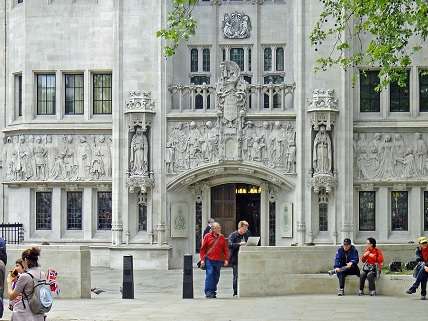UK Supreme Court: Parliament Must Approve Brexit
But regional assemblies don't have to.

The Supreme Court of the United Kingdom ruled as expected this morning, denying the British government's appeal of a lower court's decision that the government must consult Parliament before withdrawing the United Kingdom from the European Union (Brexit).
Prime Minister Theresa May's government, which argued in court it could use the power of "royal prerogative" to trigger Article 50 says it has enough votes in the Conservative-controlled Parliament for an approval of Brexit, and already has four versions of legislation prepared, in anticipation of a number of different ways the Court may have ruled. The court decided ultimately that the regional assemblies did not have to agree to Brexit as well, ruling that the Sewel Convention, which dictates that Parliament "normally" has to seek local approval on issues that have been devolved to constituent nations, did not apply.
The government was appealing a lower court decision on a lawsuit that argued that withdrawal from the European Union involved a change in law and a loss of rights for citizens, particularly for Briton immigrants on continental Europe, with Expats for a Fair Deal being a primary claimant in the suit.
"The UK's constitutional arrangements require such changes be clearly authorised by Parliament," Lord Neuberger, the president of the Supreme Court, ruled. "The referendum is of great political significance, but the Act of Parliament authorising it did not say what would happen afterwards." Parliament will now have to pass a law that does, and May has said she intends to invoke Article 50 by the end of March
As The Guardian explains there will still be some "bumps in the road," no matter how short that bill can theoretically be, because members of Parliament will attempt to amend the bill. "Labour favours procedural tweaks that can get enough Tory support to pass," the paper reported. "The Liberal Democrats and Scottish National party will put up more symbolic resistance."
Yesterday, Germany Defense Minister Ursula von der Leyen pushed back in a BBC Hardtalk interview when asked whether the EU had no choice to be "tough" in its exit negotiations with Britain. Von der Leyen said she wanted to "diminish the tone that is always pushing towards make it tough, make it hard," saying disentangled would not be an easy task but that the EU and UK were "on the same side" because they share common values and common threats, so should "find a smart and convenient way to organize our future relationship."
The Supreme Court of the United Kingdom was established in 2009, taking over the judicial responsibilities of the House of Lords, after being approved in a 2005 referendum. It does not have the authority to repeal primary legislation (acts of Parliament) but only secondary legislation (mostly executive rules and regulations). The chances of Article 50 being invoked by the end of June jumped 8 percent in the last four hours, to 88.5 percent, on ElectionBettingOdds.com.


Show Comments (9)